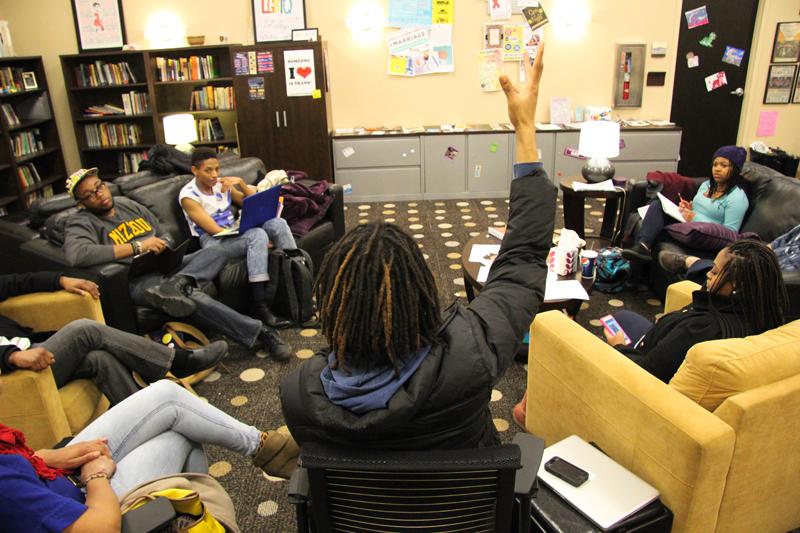There was room on the furniture in the LBGTQ Resource Center for the five members of Queer People of Color to spread out during the March 11 meeting. The furniture had been arranged in a circle so each member faced each other.
The train of thought was one fluid idea spoken aloud by each member. When discussing upcoming events, members practically finished each other’s sentences.
With about seven members per meeting, more people at the organization’s weekly meetings would be nice, members said.
QPOC is going through a transitional phase to do just this.
Triangle Coalition president Taylor Dukes will be speaking to QPOC on changing the organization of meetings to gain more members. Members of QPOC will be looking at the Legion of Black Collegians and the Feminist Student Union as examples of how to run meetings that attract people.
QPOC is an umbrella organization under TriCo, but the organization’s meetings and events do not parallel those of TriCo’s.
There’s a connection between race and ethnicity, and sexual identity and expression, Vice President Sequoyah Moore said.
“We want to showcase that as much as possible to show that, although our numbers are few, we do have a voice and we do have important things to say,” Moore said.
What separates QPOC from TriCo is that QPOC addresses issues relevant to people of color.
“We are inherently different than TriCo because we provide…space for Queer People of Color and our allies to cultivate self-love, loving others and promoting peace amongst the world,” President Marcus Thurmond said.
The core group that created QPOC’s constitution a few years ago is gone.
“The problem is, it was a core group of people and that was it,” said Kenneth Bryant Jr., a graduate student and QPOC member.
The very name of QPOC is what current members fear is deterring people from joining.
“Some people don’t feel comfortable identifying as queer,” Thurmond said, “They feel as if it is a derogatory term.”
Bryant also credits the stigma attached to the word queer and the lack of visibility of the organization on campus.
“Most people don’t want to be publicly associated with an organization with the name queer,” he said.
Moore, who identifies herself as a queer, said she actually joined QPOC because of its name.
“I wanted to be part of an organization more geared toward me,” she said.
Thurmond said he didn’t receive strong support from his parents after coming out. Once he came to MU, he researched organizations on campus that would support him in his decision.
“QPOC was specifically for me,” he said.
QPOC is focusing on creating successful events to build up its membership and to create a safe environment for queer people of color, Bryant said.
QPOC will be showing the movie “Pariah” on April 17. The film focuses on a lesbian teenager acknowledging her identity as a lesbian. Its book club will read “For Colored Boys,” a collection of stories about queer experiences. The book will be discussed at future meetings. A tea party has been scheduled for May.
Funding for events is acquired through TriCo, the Chancellor’s Diversity Initiative, LBC and the Multicultural Center.
Moore said her favorite QPOC event was when the organization watched the web series “The Peculiar Kind,” which follows the lives of queer women of color.
“It talked about issues that you wouldn’t normally hear about around TriCo and the LBGTQ Resource Center,” she said.
Thurmond said he likes how members are friends and can hang out outside of meetings and that it is more than just a structured organization.
QPOC meetings are held at 7 p.m. every Monday in the LBGTQ Resource Center.
“The greater the number of members, the more recognized you are,” Bryant said.
Thurmond expressed a similar sentiment.
“I just wish we had consistent membership,” Thurmond said.








